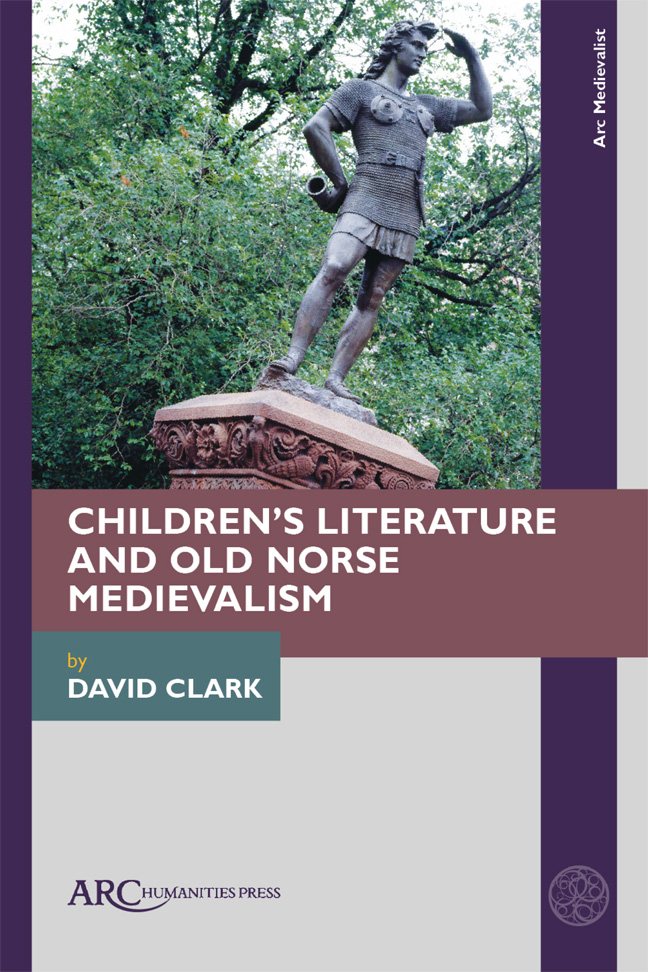Book contents
- Frontmatter
- Contents
- Acknowledgements
- Dedication
- Introduction: The End
- 1 Age-Related Categories
- 2 Generic Categories
- 3 Transformational Fantasy
- 4 Horned Helmets and Comic Anachronism
- 5 Viking Reputation
- 6 Runes and Magic
- 7 The Power of Story
- 8 Race and Ethnicity
- 9 Heroism
- 10 Viking Masculinity
- 11 Viking Femininity
- 12 Viking Sex and Gender
- 13 Bowdlerization
- 14 Sexuality
- 15 Ecological Threat
- 16 Norse Medievalism in Alan Early's Father of Lies Trilogy
- 17 Avoiding the End of Days: K. L. Armstrong and M. A. Marr's Blackwell Pages
- 18 Rick Riordan's Magnus Chase Series and Norse Medievalism
- Conclusion
- Select Bibliography of Frequently Cited Works
- Index
16 - Norse Medievalism in Alan Early's Father of Lies Trilogy
Published online by Cambridge University Press: 17 February 2024
- Frontmatter
- Contents
- Acknowledgements
- Dedication
- Introduction: The End
- 1 Age-Related Categories
- 2 Generic Categories
- 3 Transformational Fantasy
- 4 Horned Helmets and Comic Anachronism
- 5 Viking Reputation
- 6 Runes and Magic
- 7 The Power of Story
- 8 Race and Ethnicity
- 9 Heroism
- 10 Viking Masculinity
- 11 Viking Femininity
- 12 Viking Sex and Gender
- 13 Bowdlerization
- 14 Sexuality
- 15 Ecological Threat
- 16 Norse Medievalism in Alan Early's Father of Lies Trilogy
- 17 Avoiding the End of Days: K. L. Armstrong and M. A. Marr's Blackwell Pages
- 18 Rick Riordan's Magnus Chase Series and Norse Medievalism
- Conclusion
- Select Bibliography of Frequently Cited Works
- Index
Summary
THIS CHAPTER EXPLORES the medievalist dynamic of Alan Early's Father of Lies trilogy (formerly Father of Lies Chronicles), published between 2011 and 2013. It picks up on some of the themes considered earlier, including the relationship between history, myth, and story; runes and magic; gender; ethnicity; ecological threat and adolescent autonomy. But it also introduces new themes that are not so prominent elsewhere in contemporary medievalism for children, such as the role of technology, mental illness, and disability.
Alan Early is a novelist and motion graphics designer born in Leitrim, Ireland, and now based in Dublin, and Arthur Quinn, his teen protagonist, followed a similar urban-ward trajectory. Arthur is transplanted from County Kerry (in south-west Ireland) to Dublin (on the east coast) after his mother dies and his father gets a job as chief engineer for the new Metro. The diggings disturb the cave in which Loki has been imprisoned, and he escapes, wanting to awaken “this Jormungand thing, an ancient, giant snake that will destroy the world…buried under the city” (1.173).
The trilogy's Dublin setting is explained by a statement that the city represented “the edge of the world” for the Vikings (1.174). This is an odd choice of words, given the Norsemen's documented travels as far west as the coast of America, as far east as Russia, and as far north as Iceland and Greenland (both often identified with the Classical and medieval mythic island of Ultima Thule). Nonetheless, Dublin was indeed a Viking stronghold in the mid-to-late ninth century. Although Viking warriors feature in a supporting role in the novels, the series does not focus on its protagonists’ Norse heritage, though the second novel explores the importance of Ireland's more recent past, as we shall see. In the series as a whole, Arthur and his friends are very much ordinary Irish children who draw on their innate courage and goodness to combat evil within a Norse medievalist context and aided by Norse artefacts.
“Gods—good…Loki…bad”: Uncomplicating and Recomplicating Norse Mythology
A number of chapters in the first book begin with the phrase “In a time before written history, in Asgard, the realm of the gods…” (1.22) Employing this traditional story-telling mode enables Early to interpolate important background information on Norse mythology. The myths are presented as straightforward retellings, but Early makes several silent alterations of emphasis and fact.
- Type
- Chapter
- Information
- Children's Literature and Old Norse Medievalism , pp. 129 - 142Publisher: Amsterdam University PressPrint publication year: 2023



